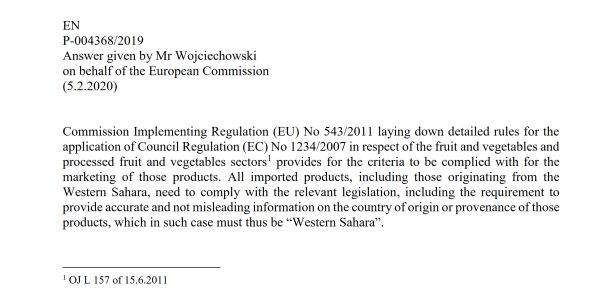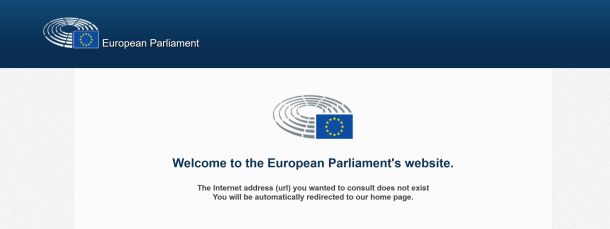
The EU Commission is now seeking the EU member states approval to brush aside the judgement of the Court of Justice of the EU, by negotiating a new agreement with Morocco for trade with occupied Western Sahara.
Photo above: Federica Mogherini, High Representative of the EU for Foreign Affairs and Security Policy, and Moroccan Minister of Foreign Affairs, Salahedine Mezouar.
Does the EU have to abide by EU law? That is in essence the question, as the European Commission is now requesting EU Member States for a mandate to re-negotiate a controversial trade deal with Morocco, so as to include goods from the occupied territory of Western Sahara. In the past, Western Sahara products have implicitly been included in that trade, but this was found to be unlawful in a ruling by the Court of Justice of the EU (CJEU) on 21 December 2016.
Now, the Commission wants to try again.
Today, 10 May, the Danish Parliament's EU Affairs Committee and the Danish Government discussed the EU Commission's request. No arguments were presented by the government as to why Morocco and the EU have the right to negotiate the conditions of trade with Western Sahara, which the CJEU had found to be a territory that is 'distinct and separate' from Morocco. Neither were any arguments given as to what Morocco potentially can contribute in relation to seeking the consent of the people of the territory that it illegally occupies.
As the Danish debate with the Minister for International Development heated up, it was decided to defer to a later date to allow for an exchange of views with the Minister for Foreign Affairs.
Similar hearings are now taking place across Europe and the Member States will soon vote on the mandate for the negotiations.
According to sources close to the Commission, the mandate that it wishes to obtain intends to assimilate Western Sahara products to those from Morocco by bypassing the Saharawi people's right to consent, and instead opt for a green light from Moroccan institutions.
It is not clear how the Commission would find any legal basis to do so. In hearings in the Court of Justice last year, the Commission had specifically stated to the Court that it was never the intention to include Western Sahara in the EU-Moroccan trade, that this was done unilaterally by Morocco, and that it would be illegal to de jure include Western Sahara, due to matters of international law.
Now, the Commission makes a u-turn in its approach vis-à-vis the Member States. Either the Commission has changed its opinion on international law since it pronounced itself in Court, or the lawyers of the Commission lied in Court. The act of knowingly including Western Sahara in the scope of the deal with Morocco is at least diametrically the opposite of what was stated in Court.
On 21 December 2016, the EU's Supreme Court ruled that no trade or association agreement with Morocco could be applied to the territory of Western Sahara, since Western Sahara is not part of Morocco. Accordingly, the Court stated in § 106, the people of Western Sahara ought to be viewed as a third party to the EU's relations with Morocco. And for any such bilateral arrangement to affect the third territory of Western Sahara, the express consent of the people of the territory should be obtained.
The Swedish government stated that the court judgement was in line with their historic position.
In the talks about a new mandate, it is rumoured that the Commission would have altogether eliminated any reference to the people of the territory - which is the core of the judgement - and instead refers to 'population'.
"We have serious reasons to fear that the Commission’s plan is plainly to circumvent the ruling of the EU Court of Justice. But, there is no way out of that ruling: the “people” of Western Sahara need to give their consent, not the “local population” mainly composed of Moroccan settlers", stated Margrete Auken, Danish Member of the European Parliament (Greens/EFA).
"We cannot take the risk to see the EU once again violate the rights of the Sahrawi people, damage our collective credibility as a law-abiding regional block and put our European businesses in limbo. We are keen to hear the Danish government give us the details on the Commission’s proposal and the Danish position in the Council", Auken said.
EU Commission backtracks on labelling Western Sahara goods
What is EU's position on labelling of products from occupied Western Sahara? The EU Commission has now for the third time published a response to a parliamentary question on the matter, but the latest version fails to address the question.
Why does this EU statement keep disappearing?
A clarification by the EU Commission on labelling of products from Western Sahara was published, then removed, then published again and has now been removed again from EU websites.
EU reaffirms: Western Sahara products to be labelled as such
Two weeks ago, the EU Commission announced that products from Western Sahara should be labelled accordingly, only to withdraw that statement the very next day. Today, the Commission reaffirms its original position.
Spectacular backtracking by EU Commission on Western Sahara labelling
On 5 February 2020, the EU Commission announced that products from Western Sahara should be labelled accordingly. But about 24 hours later, all traces to that statement had been removed from EU websites.



